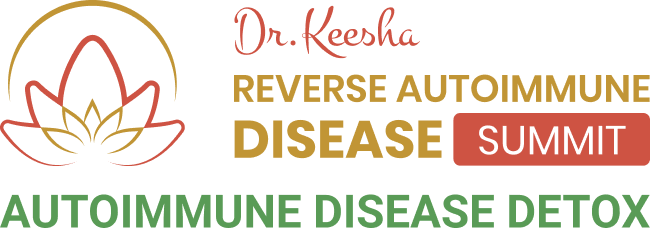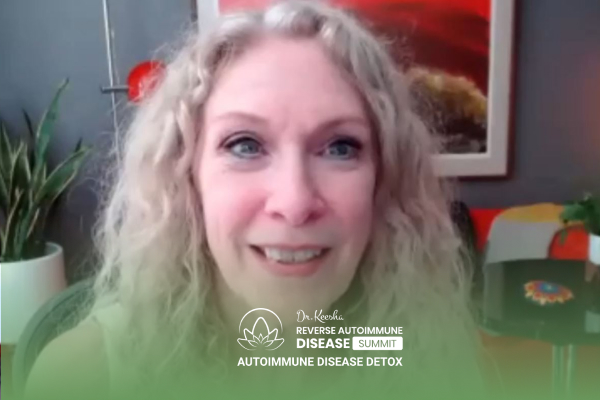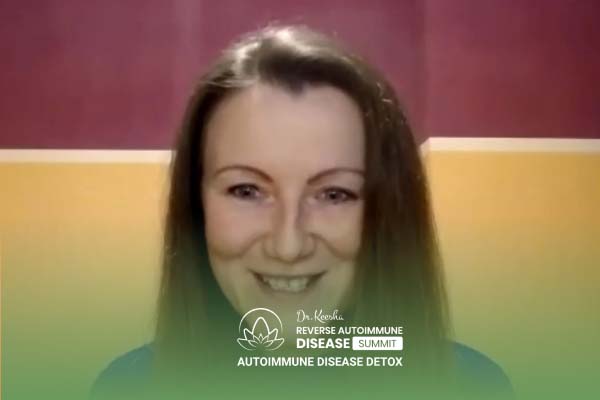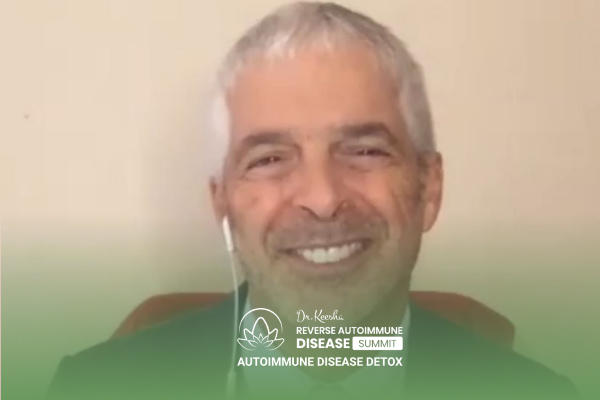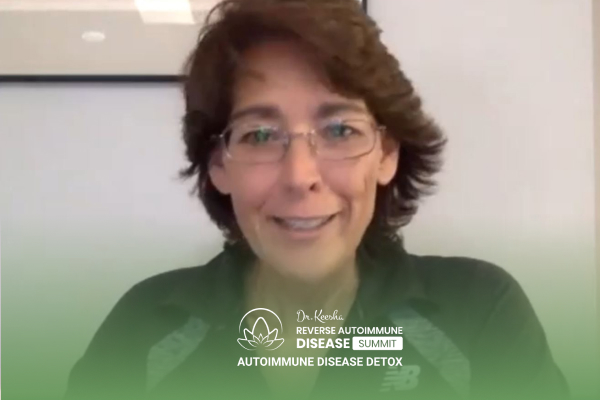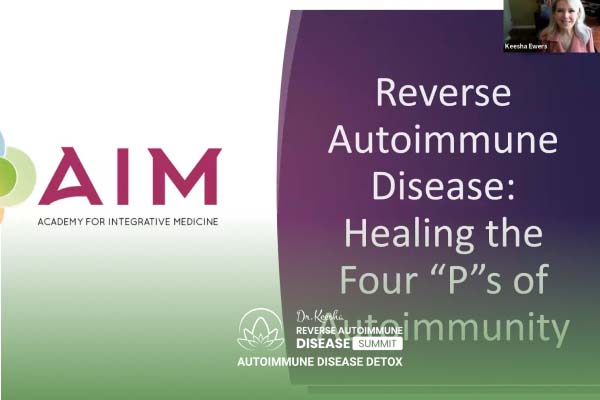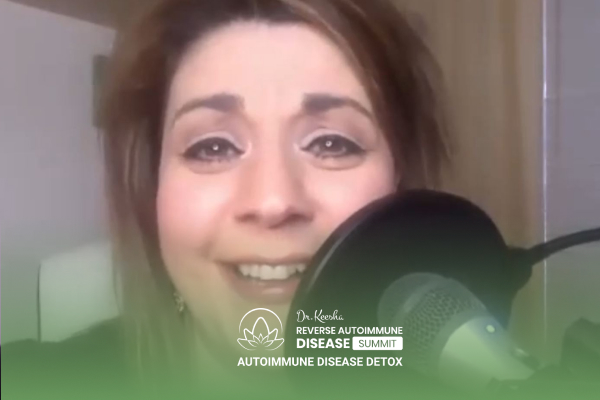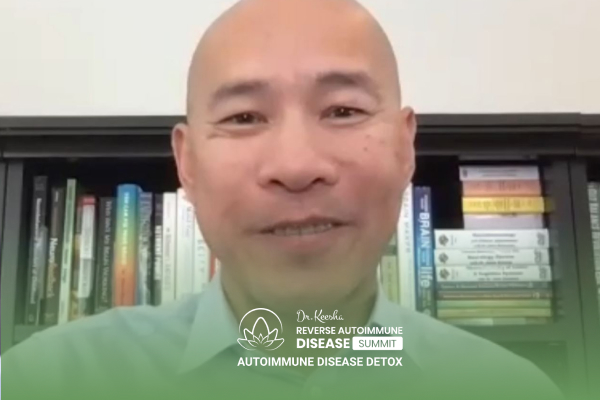Join the discussion below
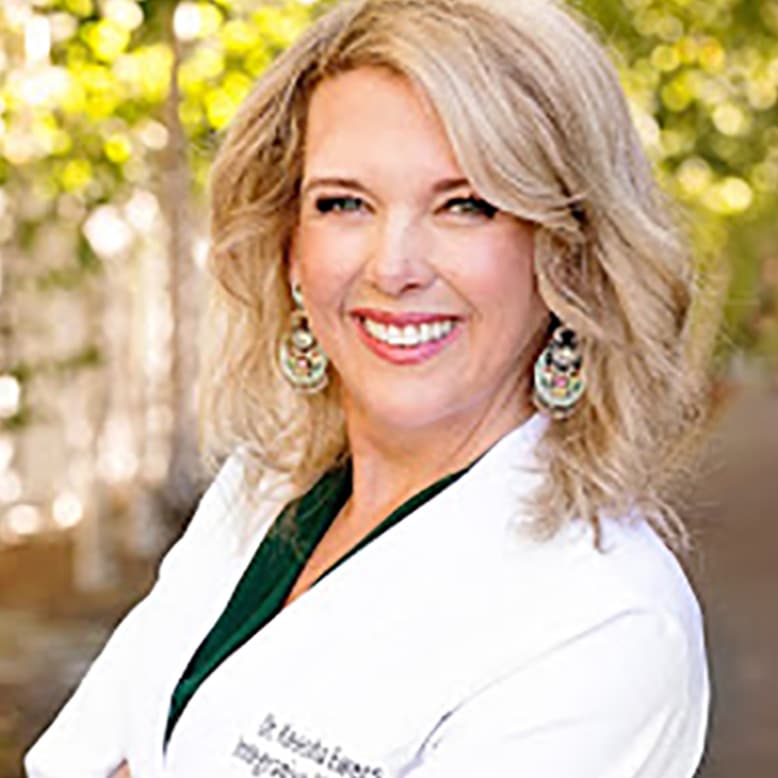
Keesha Ewers, PhD, ARNP-FNP-C, AAP, IFM-C
Dr. Keesha Ewers is an integrative medicine expert, Doctor of Sexology, Family Practice ARNP, Psychotherapist, herbalist, is board certified in functional medicine and Ayurvedic medicine, and is the founder and medical director of the Academy for Integrative Medicine Health Coach Certification Program. Dr. Keesha has been in the medical field... Read More
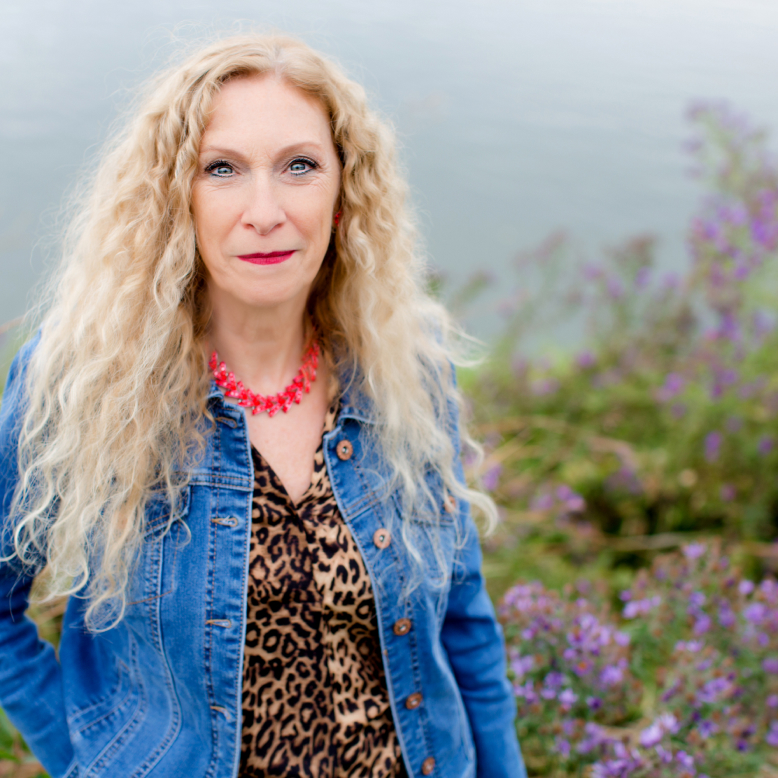
Sheree Clark is a Midlife Courage Coach, TV show host, inspiring speaker and accomplished author. Sheree has written and presented on topics ranging from finding your passion to overcoming career burnout. Her Fork in the Road coaching practice keeps her busy working with clients one-on-one and in groups on creating... Read More
- How to know when you’re not iving up to your potential or purpose
- When you shoul (and shouldn’t) settle
- Baby steps to take today to start living your BEST life without apology
Related Topics
Autoimmune DiseaseKeesha Ewers, PhD, ARNP-FNP-C, AAP, IFM-C
Welcome back to the Reverse Autoimmune Disease Summit Series, everybody. I’m Dr. Keesha, and of course this is the fourth iteration of the Reverse Autoimmune Disease Summit Series. We’re talking about the autoimmune detox. And we’re referring back once again, to the fact that you are unique, and you have your own unique puzzle. And there are four corners to every puzzle when we’re solving it. You have your own unique genetics, you have your own unique gut health, you have your own unique past, stress and trauma, and how you’re managing those today. And then you also have your own unique toxic burden. And one of the things that I always talk about is the fact that toxic burden isn’t necessarily BPA and glyphosates. It’s also the stuff that’s here. And so we’re going to talk a little bit about that today. I have a lovely friend that is going to be sharing midlife courage. So this Sharie Clark. She’s a midlife- I just said Sharie and you reminded me, Sheree. This is Sheree Clark. She is not Sharie. Sheree Clark, we were just laughing about this. Sheree Clark is a midlife courage coach, TV show host, inspiring speaker and accomplished author. She’s written and presented on topics ranging from finding your passion to overcoming career burnout. Her Fork in the Road coaching practice keeps her busy working with clients one on one and in groups on creating an authentically fulfilling life. In her personal time, Sheree and her cat, Lotus, work on their yoga poses and we’re going to have her contact information here. So, welcome to the series, Sheree.
Sheree Clark
Thank you, Dr. Kusha.
Keesha Ewers, PhD, ARNP-FNP-C, AAP, IFM-C
Kusha Evers.
Sheree Clark
Yeah, that’s right.
Keesha Ewers, PhD, ARNP-FNP-C, AAP, IFM-C
Yeah, I have a million different variations. My deepest apologies. That is so funny because we were talking about it and I said, “Oh, I can see where you start reading the bio “that you would do that,” and sure enough I did it.
Sheree Clark
I love it. I love that we just laughed about it and didn’t just try to cover it up and redo it.
Keesha Ewers, PhD, ARNP-FNP-C, AAP, IFM-C
No, no, I’m all about the laughter and the humor and all of the things. It’s the way to get healthy. So, speaking of healthy, we talked about detoxing old beliefs as your talk title so that you can live the second half of your life for you and one of the things that I notice in people with autoimmune disease, women are diagnosed with 80% of autoimmunity, so 80% of the autoimmune diseases in the world are in women. That being said, I have noticed a pattern in women with autoimmunity. I call it the three or four Ps, depending on who I’m talking to, but the three Ps are people pleasing, perfectionism and holding onto the poison of past pain. And then in Ayurvedic medicine, they always say it’s pent up people, the people with a lot of fire, that wind up with autoimmunity for the most part. So with all of that being said then people pleasing and perfectionism, these are old beliefs that make it so it’s really difficult to live the second half of your life for you, isn’t it?
Sheree Clark
Oh, that, and all of those Ps. Every last one of them absolutely makes it difficult. They’re impediments, there’s a “P” in their, too.
Keesha Ewers, PhD, ARNP-FNP-C, AAP, IFM-C
There’s another “P.” Impediments to the passionate you.
Sheree Clark
Yes, please.
Keesha Ewers, PhD, ARNP-FNP-C, AAP, IFM-C
Please, yeah. And so you know when midlife comes along, a lot of times this old term, “midlife crisis,” has been stamped into our cultural mindset and if somebody is behaving against the grain then they must be having a midlife crisis. So let’s talk about midlife courage and what midlife courage coaching actually means.
Sheree Clark
Well, I got to self-proclaim my title and I call myself a midlife courage coach because I believe it takes guts to live the second half of your life for you when you’ve lived the first half for everybody else, which really dials into what you were talking about in terms of both people pleasing, the past, just bringing all of that stuff forward. And so when I talk about that, I also often talk about the roles that we’ve had as women and if you think about it for just one second, if you took a quick inventory of all of the roles that we fulfill … First of all, let’s start with one that every single one, regardless of your gender or where you live or your nationality or any of it, we are all offspring because we’ve all had parents, right?
So offspring is a role and that might be, for some of us, you’re offspring on many levels. You might have adoptive parents if you were an adopted child and birth parents and then you’ve got, maybe you’ve got, you’ve had foster parents or stepparents or whatever and then so all of a sudden, if you do that and multiply it into every single role that you have, sometimes as a spouse or as a parent or as an employer, an employee, a friend, a volunteer, all of those things and all of a sudden, you start thinking, “Holy cow, I can see where all “of those things were put on me and if every one of them “has a people pleasing component, then holy cow. “No matter we’re exhausted. “We’re endowed in autoimmune.”
Keesha Ewers, PhD, ARNP-FNP-C, AAP, IFM-C
Right, and so what is your methodology then as you’re working with people? Because midlife, I always think about menopause in women and andropause for men is … “Menopause,” it means it’s time to take a pause. It’s time to really stop. And I found myself on the top of a mountain in Colorado with the Lakota-Sioux doing a vision quest for my menopause and I wasn’t intentional. I remember sitting up there. It’s four days, three nights with no water, no food and you’re just in that space with asking for a vision for the next step of whatever you’re up to and I remember thinking, “Oh, I’m actually in the middle of menopause. “I self-selected to take some time away “from everything, right? “And really sit with this. “What is it that I want the last part “of my life to look like? “What intentional doorways do I want “to open and walk through “that aren’t just reactions to the flow of life “that I’ve generated up until this point? “So how do I want to be really, really intentional “about the last years that I will be on this planet?” And a lot of people don’t think to do that.
Sheree Clark
Yeah.
Keesha Ewers, PhD, ARNP-FNP-C, AAP, IFM-C
And you don’t have to go up on the top of a mountain and go and fast by the way. To do this. You do not have to do that.
Sheree Clark
No, no.
Keesha Ewers, PhD, ARNP-FNP-C, AAP, IFM-C
Yeah.
Sheree Clark
So, I have a couple different ways that I look at it, but let’s talk in kind of in terms of generalities because I think people are really more interested in like, “Yeah, how do you even “get your head around something like that? “Where do you even start?” And so one of the starting places for me, I indicated like the roles. Taking an inventory of where you’re at. So in my work, just like yours, the first step has got to be diagnostic. I could be great at solving a problem, but if the problem I’m solving isn’t the one you have, I haven’t done you any favors. So making sure that what we think is the issue, the problem really is that, and so taking an inventory of where’s the itch? Before we scratch anywhere, let’s find out where the itch is.
So what roles aren’t working? Are there roles that you can be releasing and letting go of? Or shifting, pausing, whatever those things are. That’s one early place. Another early place is we talked about the past as though it’s a pariah. There’s a lot of Ps in this conversation. It’s a good thing we’ve got my pop filters or we’d be all over the place. But the past isn’t a pariah. The past can also be informative. And so looking at the past with a healthy viewpoint. So one of the things that I really love to do is regret work.
Now I’m sure everybody listening is going, “Oh dear God, now I’m never going to work with her. “I don’t want to look at anything. “If I regret it, I’m just gonna close my eyes “and say, ‘Yuck, that’s terrible.'” But the thing is that our regrets, when we can look at them from the vantage point of our wise selves now have a lot of takeaways for us. Notice I didn’t say necessarily “lessons,” because that’s one of those punitive words that we go, “Ew.” It sounds like spinach when you’re a kid.
Keesha Ewers, PhD, ARNP-FNP-C, AAP, IFM-C
“Did you learn your lesson from that, young lady?”
Sheree Clark
Exactly, who wants that crap? No, it’s what’s my takeaway from my regrets and I have a methodology that I do with people to help them get to that point that’s not painful, that’s not dregging, dredging up every past horrible thing, misdeed, but it’s a way of looking at it because what I like to do is categorize them. We are creatures of habit and so what how we often do one thing is how we do many things. So if your regret stems from a particular behavior, a belief, a pattern, then finding a clump of those and being able to say, “I can’t unring that bell, “but I can stop it from ringing it again in the same way.” So that’s just two kind of early ways of looking at it. It’s really taking a look at where am I before I run off and solve a problem. Let’s make sure I got the right problem.
Keesha Ewers, PhD, ARNP-FNP-C, AAP, IFM-C
I’d love to speak to regret for a second. So just like you said, it’s not opening up Pandora’s Box to pull another “P” through. It’s actually, in Tibetan Buddhism, which I am right now doing a Master’s in Divinity and Tibetan Buddhism and so it’s up for me, but they use regret as a really informative piece of information like you’re doing. What they say is if you do not have regret, you are more likely to repeat the problem and injure again. And so they think about holding regret as something that is to be evaluated every night before you go to bed so that you’re making sure that you’re not going to repeat that pattern going forward. You get to have it illuminated and see it and say, “Oh, yeah, that was, that hurt me or somebody else “and I regret that and so therefore I want “to shift my behavior, my thought process “that went underneath it so that I can change the karma “of the future.”
Sheree Clark
Yes, I love that. And especially doing it at a day to day so you’re stopping it from accumulating. It’s like a regret detox what you just described as the regrets are coming in. The other cool thing about that is when you look and find those patterns and start to identify those is that you can say, “I think I understand “where this came from and I think I understand how “to short circuit it for the next time.” And then release it. It’s over; it’s the past. Like, you’re just adding insult to injury if you drag it forward. And then the final thing I want to say about that, and maybe it’s not final, maybe you’ve got something else to add, but–
Keesha Ewers, PhD, ARNP-FNP-C, AAP, IFM-C
I have something else to add, so it’s not final.
Sheree Clark
That’s right, exactly. That, regret, it’s got so much to teach us and when we are of a certain place and we’re looking back on it, many times it’s from the vantage point of wisdom where we might say, “I regret that marriage, “but without that union, I wouldn’t have had this child.” Or, “I regret this, but not for the reasons “that I thought that I did when I was younger. “It’s for something different.” So sometimes looking back allows us to update the files. It’s like a system upgrade. You can go, “You know what? “I thought I regretted that, but maybe, maybe not.”
Keesha Ewers, PhD, ARNP-FNP-C, AAP, IFM-C
Yeah, that’s beautiful. There’s this thing that I do where I’ll say, “Okay …” I was just talking to Dr. Kira Bar, who’s a dermatologist on one of our interviews, right? We were talking about how the skin shows the map of where problems of detoxification are happening, whether it’s physical, mental, emotional or spiritual. And I was saying, “Ooh, I wish I could go back “to my 16-year-old version of myself and say, “‘Stop smearing yourself with baby oil “‘and putting aluminum foil on your face “‘and frying yourself.'” And the same thing is true where, when you find a point of regret to be able to go back to, like I’m coming from a 56-year-old version now to go back to my 30-year-old version or my 40-year-old version and say, “Oh, sweetie, you were operating “with the skill level you had in that moment,” and forgiving that part of you.
That version that you’re looking back with regret and saying, “I should’ve done that differently,” but you’re coming from the wisdom eyes of today that you didn’t have back then, right? I think that’s so important. And there’s another thing that bogs us down that I think keeps us looking at regret and I call it the Tyranny of Positive Thinking. I just kind of think with like the laws of manifestation and all the things that are being touted right now that those are important and, and you get to have your feelings and looking for regret is helpful instead of, I call it spiritual bypass, where you go over the abscess and you build a school on top of the toxic waste. It’s gonna come up and it’s going to actually be toxic in whatever part of your life that you’re trying to bypass whatever that was. So it’s, I think it’s important to go and find those places like you said. I’m so glad that you go and you excavate because you want to make sure that what you’re building on is good, solid land that doesn’t have a bunch of toxicity underneath it that’s going to make the schoolchildren sick.
Sheree Clark
Bingo, exactly.
Keesha Ewers, PhD, ARNP-FNP-C, AAP, IFM-C
Right?
Sheree Clark
Let’s avoid that.
Keesha Ewers, PhD, ARNP-FNP-C, AAP, IFM-C
Let’s avoid that, yeah, so yeah. Just that you’ll always have to have positive thoughts, the tyranny of that is, it makes it feel like you’re a failure all the time.
Sheree Clark
Right, yeah, I concur with that whole concept about, and there are some days … I like to say it this way. If we are always operating at peak performance, then it’s not peak performance, it’s something else. And so sometimes you don’t have a positive day. Sometimes it’s a shitshow and I say let that happen.
Keesha Ewers, PhD, ARNP-FNP-C, AAP, IFM-C
Yes, yes, and it’s only by having the shitshows that you learn organizational skills.
Sheree Clark
Right.
Keesha Ewers, PhD, ARNP-FNP-C, AAP, IFM-C
Right?
Sheree Clark
So true.
Keesha Ewers, PhD, ARNP-FNP-C, AAP, IFM-C
So why, why do you think this takes so much courage to do? Cause it does take courage. What we are talking about right now is, that’s courageous.
Sheree Clark
I think part of it is because we become used to status quo for one thing. It’s like, “Well, this is the way it’s always been. “This is the way it’s always gonna be.” The whole “Why bother” mentality. The other thing is that other people … Think about the expressions that we have. “Let’s let sleeping dogs lie.” Even my expression, “You can’t unring the bell, “so why would you go back to revisit it?” There’s some of those kinds of thinking, it becomes kind of the mediocrity of the masses. Like, “Why are you trying to rock the boat? “Why do you want more? “Isn’t it good enough?” And I see a lot of that. The other thing is I think that people get pigeon hold. Remember all those rules that we started by talking about your scene is being a certain way. “Oh, well, that’s how you are.” I was just recently reunited with my sister, who I haven’t spoken with in 30 years. Long–
Keesha Ewers, PhD, ARNP-FNP-C, AAP, IFM-C
Congratulations.
Sheree Clark
Thank you, thank you. Yeah, it’s been an interesting journey, let’s put it that way, because predictably, in the beginning it’s kind of a love fest. It’s like, “Where have we been each other’s lives? “Oh my gosh, how could we let this happen?” But now we’re rediscovering one another and here’s the thing. The last time we saw one another, we were both kids. I mean, I was going to college and she was younger than that. And so locked in my memory, in my recollection, is a freeze frame of an 11-year-old girl and that’s not her anymore and I’m not 17. And so, and my math is all off because I’m way older than however 17 and 30 is, but hey, whatever it is. We haven’t talked to each other in a long time. But so we’re both having to remind ourselves of that, “Oh, wait, before I say that I need to do an upgrade. “I need to do an update. “I need to remember.” And I think that’s what happens is that we all get bobbed into that. The people around us think that we’re still fill-in-the-blank, even if they’ve seen us every day because they don’t know–
Keesha Ewers, PhD, ARNP-FNP-C, AAP, IFM-C
We just had this happen. My father passed away about 10 days ago and we’re actually recording this in March, everyone, and it’s airing in April so he died February 15th. And so, talking about math. My brother, who doesn’t live in the same area as I do, I thought we, we came together and we just swimmingly got things done and called all the people that needed to be called for my mom. Did every, we worked so well as a team. It was beautiful. I was just like, “Wow, this is so beautiful. “I’m so happy that he’s here.” And then I went back to work for a couple of days and then the night before he was supposed to fly back to California, I went back down to my mom and dad’s house and we were gonna have dinner that night and something had happened in my brother’s head where it was like no longer was a 53-year-old sitting in front of me.
He was eight. And I could tell like something was going. I said, “Is something happening for you?” And he just like, blah and just, oh my gosh and it was mean and it was just like, phew. And I just looked at him and he said, “My goodness, this must feel terrible to you. “Like just the level of suffering “that you’re obviously feeling.” And I said, “What you’re referencing right now “happened 40 years ago. “Is there a way that we can bridge the 16-year-old version “of me and the 56-year-old version “and the eight-year-old version of you and … ” And so, then again our math is off because it would’ve been 13-year-old for him.
So just it’s 40 years and it’s fresh. Fresh, right? And I could tell that this was not my brother of today sitting there and we’ve already unpacked all of this stuff and done a lot of work around it and I’ve apologized and cried and said, “I wish I’d been different then for you in that moment.” And it was all back to that place again. And so just to be able to hold that space and say, “Oh yeah, that’s what’s going on,” instead of getting defensive, getting hurt. It’s really important to be able to recognize that when family dynamics are happening, cause this happens, I was actually thinking, “Wow, a family death just happened “and we just skated by with no drama? “This is remarkable.” Yeah, shouldn’t have said that in my head.
Sheree Clark
Oh, well, Keesha, the cool thing is that the reason my sister and I reconnected was the same thing. My mother passed and our family had been fragmented and not speaking and all that stuff. So here’s the theme for both of us to remember to move forward and for anyone listening. Try and be curious.
Keesha Ewers, PhD, ARNP-FNP-C, AAP, IFM-C
Right.
Sheree Clark
Not furious and–
Keesha Ewers, PhD, ARNP-FNP-C, AAP, IFM-C
Compassion and curiosity, right?
Sheree Clark
Yes.
Keesha Ewers, PhD, ARNP-FNP-C, AAP, IFM-C
Yeah.
Sheree Clark
Right, and it’s so, it’s so bridging and healing.
Keesha Ewers, PhD, ARNP-FNP-C, AAP, IFM-C
Yeah, to just like, “Wow, this must hurt for you,” and not feel even an iota of defensiveness. If you can do that, then it allows the person to really drop in and then they have nothing to fight against.
Sheree Clark
Yes.
Keesha Ewers, PhD, ARNP-FNP-C, AAP, IFM-C
Right? There’s nothing to fight against in that point.
Sheree Clark
As long as–
Keesha Ewers, PhD, ARNP-FNP-C, AAP, IFM-C
It’s just tilting at windmills.
Sheree Clark
I think the important part is for it to not be a condescending, “Oh, this must be hard for you.”
Keesha Ewers, PhD, ARNP-FNP-C, AAP, IFM-C
Oh my gosh, yes.
Sheree Clark
But a compassionate one. I’m the older sister, and if I had said something like that to my younger sister, oh, holy crap. It would’ve ignited it to a powder keg. So as just the important part, my point is that what you said, Keesha, you need to be clear with yourself where it’s coming from in here. And if it’s not coming from in here, zip that lip and wait until it can.
Keesha Ewers, PhD, ARNP-FNP-C, AAP, IFM-C
Yeah, and then if, like my brother responded really well. He recognized, he was like, “Yeah, this doesn’t make any sense. “This is the 13-year-old version sitting here “and it has been 40 years “and so I know this isn’t really about you. “This is my twist right now that’s going on inside of me.” And so he was able to own that and do that and then he said, “I’m gonna start therapy. “Like I really realize I need to do therapy,” and that was really beautiful. You’re not always gonna get that. And so if you have to have a boundary with somebody that’s vomiting emotionally all over you, you can totally do that. But again, if you can come from a loving, compassionate, open space of, right? Not furious, but curious. Sometimes you may have to have some distance and do the forgiveness process without the reconciliation. I always say, “Forgiveness and reconciliation “are not the same thing.” If somebody’s not contrite and they’re not apologetic for hurting you, then you don’t keep doing it, right?
Sheree Clark
Yup, exactly, definition of insanity, yes.
Keesha Ewers, PhD, ARNP-FNP-C, AAP, IFM-C
Right, that’s a toxic relationship that you need to detox if that’s happening. So I’m so happy for you and this is, the fact that the two of you are processing. If you can both process and grow and evolve, then that takes courage. That takes a lot of courage to be able to sit still and do that.
Sheree Clark
It does and the other thing it takes, I think for me anyway, I can’t speak for her nor would I want to, but it takes compassion and timing. Like for me, sometimes when I want to immediately respond, I have to say, “You know what? “You’re gonna count backwards from five before you respond,” because you need to do that check-in of, “How am I feeling and where in my body am I feeling it?” If she’s saying something to me and I instantly feel it here, anger, that anger point, then it’s probably better to not say right now and to let it, let me process it a little bit more.
Keesha Ewers, PhD, ARNP-FNP-C, AAP, IFM-C
Yeah, that’s beautiful. So we’re talking about second half of life and how can somebody tell if they’re not living their second half of life for themselves?
Sheree Clark
Here’s an interesting thing. It’s a slow realization oftentimes and it has been for me in the many times that it’s happened and so I’m gonna describe a scenario that I think many people will identify with and you’ll kind of see where you are perhaps on the continuum because that feeling of dissatisfaction to me is a continuum. It’s not just, “I’m happy or I’m unhappy.” There are degrees of contentment and sometimes some of them are temporary, sometimes some of them are permanent, some are progressive, some are receding. So I think it goes like this. I think at the outset you start feeling a little bit of a twinge, an itch. It’s almost like if you were sitting someplace outside and something caught the corner of your eye.
It’s like something flew by. Maybe it was a bird. Maybe it was a bush that waved or a car from, and you thought you saw something and you glance and you’re not really sure. And then you’re sure. “There’s something over there and I don’t know what it is.” And you become a little bit more conscious of it and gradually it comes more into your vision at the same time if you observe your own behaviors. So in the beginning, it might be a thought. Like, “Oh my God, I just, I should quit this stupid job.” It’ll just be a thought and you push it away. You’re like, “Nope, I need the benefits. “Nope, it’s nope, nope, nope.” And then it’ll come and it’ll stay, that thought. The thought will grow a little bit. “You know what? “I need to quit this job “because this is gonna make me sick if I don’t.” And it starts to nestle and settle in a little bit more.
And then the next phase is you say it out loud. You say to someone else, “I should just quit the freaking job.” And that’s the beginning of when change is about to happen because what’ll happen is many times you’ll say that. The first time you say it is with some liquid courage. It’s a glass of wine with a girlfriend and you’re like, “You know what? “If I had any courage at all, I’d quit this job.” “Just kidding,” and you’re taking it back. And gradually, it gets to be a little bit more, again, it’s building its nest. And then finally, you don’t care who the hell you say it to. You’re just gonna do it. So the discontent and the courage are growing at the same time and at the same pace. You know they’re there.
It’s just whether or not you choose to say, “I think I saw something out of the corner of my eye,” or you turn around and you go, “There’s a problem.” And it doesn’t matter. Don’t judge where you’re at. It took me 10 years to leave a situation that was painful and toxic for me. And when I got out of it, I did a lot of self-flagellization. I beat up on myself and said, “I can’t it took a whole decade.” That was part of my process. It’s part of the takeaways. It’s part of the things. Yes, there were regrets, but I can’t let that take any more time from me.
Keesha Ewers, PhD, ARNP-FNP-C, AAP, IFM-C
That’s beautifully said and it’s not a straight line. It’s also quite messy and squiggly. That point from here to here, right?
Sheree Clark
Yes, you find yourself. Like I said, you start to, you take things back. I’ve done it. Everybody here has done it where you’re like, “I should just leave him, just kidding. “I love him, bleh, bleh, bleh.” But you kind of meant it. You’re just throwing up a trial balloon and you’re testing not the other person, although sometimes that’s the case, but testing yourself. It’s like back in the day when we used to bake a cake in the oven and put in a cake tester and pull it out to see if there’s anything on there and that means the cake’s not done. It’s the same thing. You’re testing yourself and saying, “Can I say this and not cry? “Can I say this and feel it’s authentic? “Can I say it even just a little “and let it be out there before I pull it back?”
Keesha Ewers, PhD, ARNP-FNP-C, AAP, IFM-C
So when is the time when you have had extreme courage to be able to confront something and a time when you haven’t? Cause we’ve all had that, right? And I think about it as a spectrum.
Sheree Clark
Oh, it’s definitely a spectrum. And for me, I think, I think for me what happens is the slow build that I described builds and builds to the point where you’re like, “I really need to do something about this. “I really need to do something about this.” And then typically, and I know we have similar thoughts about this, if you don’t do something about it, the universe will hand you a deck of cards. A hand that makes you have to do something about it and far better for it to be of your own terms, but if you need that, if you need the crescendo, you need the boulder to fall on you, just wait and it will.
Keesha Ewers, PhD, ARNP-FNP-C, AAP, IFM-C
Mine was a beautiful autoimmune disease. Yes, yes, yes. “Okay, here’s rheumatoid arthritis. “Are you ready to leave that church now?”
Sheree Clark
Right.
Keesha Ewers, PhD, ARNP-FNP-C, AAP, IFM-C
So, yeah. There was a cult kind of thing that I belonged to and so I kept getting the message that I needed to get out. I needed to get out. And didn’t do it ’til I actually got diagnosed, so then I thought, “Okay, this is the wake-up call.”
Sheree Clark
Yes, and it will happen. But wouldn’t you rather have done it another way perhaps? So finding that courage, like I said, if you, when you feel like the time is right, to me, then the next smartest thing is get your allies together. Get your ducks in a row. Figure out who’s on your bench, how deep is your bench and who can you count on to help you, to prop you up when you need that and to bitch-slap you when that’s what you need because we all need both. And so for me, my deep bench includes nurturers and people that are supportive and all of those things. And it also includes a few people that are hard-asses that talk tough and that’ll say to me, “You know what? “You’re being a puss and I’m kind of tired of it, “so how bout we do something about it?” And you need both in the balance and I think that’s how we get through because for people listening, it’s usually something big. Leaving a job, leaving a spouse. It’s oftentimes leaving. Sometimes it’s going to something. Starting a new business, embarking on something. A physical challenge; a triathlon. Whatever it is, get a bench that’ll help you and support you.
Keesha Ewers, PhD, ARNP-FNP-C, AAP, IFM-C
Yeah, that’s really beautiful and if you have resource spaces inside of you where you have been successful doing that and one thing is as Sheree said, how you do one thing’s how you do most things and so you can anchor into, “Oh, I was really successful at doing it that way, “so let’s pull from that, “that place where it lives in my body, “that place where it lives in my heart and my mind. “I remember, I can do this, right?”
Sheree Clark
Yup, and we don’t forget. It’s like riding a bike.
Keesha Ewers, PhD, ARNP-FNP-C, AAP, IFM-C
Yeah, and we have. We have examples of failures and successes inside of us. Sometimes people, I’ll hear them say, “Well, I don’t have any times,” and I’m like, “No, yeah, you do. “You learned to tie your shoes, didn’t you?” I mean, really. You’re brushing your teeth every day, so. We all have success stories of some sort that we can pull from, so.
Sheree Clark
We figured out Zoom when the pandemic started. It’s all good.
Keesha Ewers, PhD, ARNP-FNP-C, AAP, IFM-C
Exactly. So if you had a do-over part in your life, would you do it?
Sheree Clark
I would change, I wouldn’t change my behaviors. I would change my timeline. There are many things I would’ve done sooner, but remember who’s talking. Who’s talking is the woman sitting here in the present day in March of 2021 and not the 18-year-old who did the dumbass thing or the whatever. It’s so I say that even realizing I might need to take that back. So no, but I’ve done my regret work. I have looked it in the eye and said, “You don’t scare me. “In fact, I’ve learned from you. “Thank you for the takeaways.”
Keesha Ewers, PhD, ARNP-FNP-C, AAP, IFM-C
That’s beautiful. I don’t have any do-overs, either that I would do for the same reasons. Like, what came from them was a wiser version of myself. That’s why I love aging. I love aging because when I think about where I was at 35, 45, 55, I’m 56 now, I think, “Gosh, there’s been a lot of evolution over those 30 years, “so what’s 75 going to be like? “That’s kind of exciting to think about.” So yeah.
Sheree Clark
Yes.
Keesha Ewers, PhD, ARNP-FNP-C, AAP, IFM-C
I want to go back to the, I’m not gonna say stupidity, but the unskillfullness of my 20-year-old self over anything.
Sheree Clark
I kinda like the “but,” though. I’ll take that.
Keesha Ewers, PhD, ARNP-FNP-C, AAP, IFM-C
So is there a baby step that our viewers can take right now to kind of tiptoe toward this?
Sheree Clark
Absolutely, I think, remember the first, if the first step is diagnostic and figuring out what, where are we, then I’m gonna suggest that if everybody is listening, not if you’re driving, but if you are in a place where you’re listening and you can settle in and do a very brief, we’re talking 90-second exercise with me. So you would begin by finding a comfortable place in your chair, being conscious of your body. I like to put both of my feet flat on the floor without my legs crossed. I like to be conscious of where my sit bones are connecting with the chair. If the chair has arms, I might rest my elbows on there. And I sit and I begin by taking a few deep breaths before I close my eyes and settle in.
And in those deep breaths, which I choose to take in through my nose and exhale through my mouth, but you can do however is comfortable. And I’ll be quiet for just a moment and let you take two of those. And with your eyes closed, if you then take your right hand and place it gently over your heart, and then take your left hand and place it atop your right, and another deep, grounding breath because you know I’m going to be asking your heart a question. And the question is, “What do you want? “What do you really, really want?” And very often, an answer will present itself almost immediately for many of us.
For some, it might take another moment. And then take another deep breath as you thank your heart and you can place your hands onto your lap and open your eyes. And I’ve done that rather quickly, but I will remind you that that is a tool that you can revisit at any time. Now for some, for me very often when I do that exercise, I feel tearful. I will feel my nose start to twitch just the way that it does before our tears spill out and sometimes I hear one word and sometimes I hear a sentence and sometimes I don’t hear anything and that’s okay because I know my heart is thinking and I know that I need to give it space and come back and revisit it. Because in the end, it doesn’t matter what anybody else says or what the books or the self-help gurus or anybody else says. It starts with your heart and that’s the first takeaway.
Keesha Ewers, PhD, ARNP-FNP-C, AAP, IFM-C
That’s beautiful, thank you so much, Sheree. All right, so … My heart spoke and I’m so happy to end an interview this way. It’s quite lovely. Is there anything that you wish we would have talked about about detoxing the last part of your life so you can live your second part with, for you, right? With intentionality that we haven’t spoken about that you would like to end with?
Sheree Clark
I think what I would end with is in listening to this conversation, something stirred you, something spoke to you. It might’ve been a sentence, a paragraph. It might’ve been a big chunk of it. Take some sort of action. If you’re driving and you couldn’t do the heart exercise, if you did it but you were kind of half-baked about it because you were listening for the doorbell, go back and do it again. It doesn’t matter what action you take, it doesn’t matter how large or how small, just do something. Action begets action.
Keesha Ewers, PhD, ARNP-FNP-C, AAP, IFM-C
Thank you so much for spending this time with us, for sharing even a smidgen of your great wisdom. I appreciate it.
Sheree Clark
Thank you, Keesha.
Keesha Ewers, PhD, ARNP-FNP-C, AAP, IFM-C
All right, everybody. Until next time, be well.
Downloads
